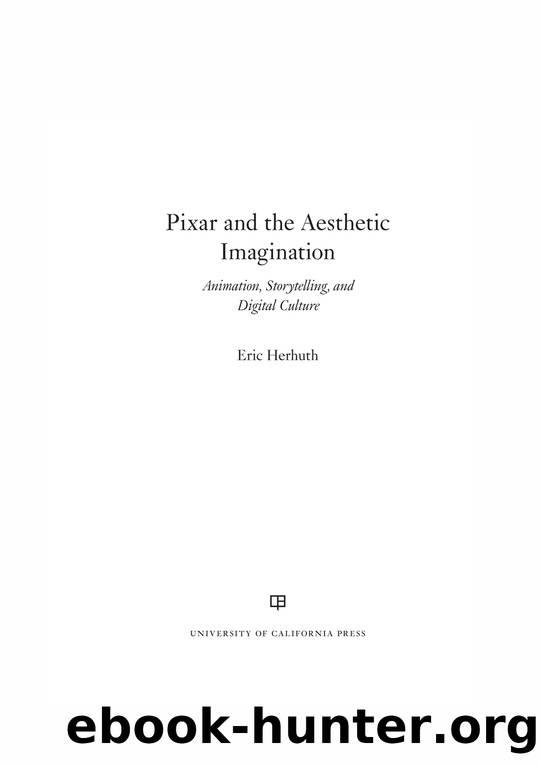Pixar and the Aesthetic Imagination by Eric Herhuth

Author:Eric Herhuth
Language: eng
Format: epub
ISBN: 9780520292550
Publisher: University of California Press
CHAPTER FOUR
The Exceptional Dialectic of the Fantastic and the Mundane (The Incredibles)
Whereas many of Pixarâs features explore alternative family formations, such as Sulley and Mike and Boo in Monsters, Inc., The Incredibles (Bird 2004) explores a traditional definition of family in American, patriarchal culture, albeit the traditional family central to the film consists of exceptional characters. The filmâs narrative follows a family of superhumans (Supers) who have been forced to retire from their superhero vocation because of public discontent. After several lawsuits, the state passes legislation outlawing superpowers and demands that Supers blend in with ordinary society. Out of all of Pixarâs films, this is the most explicit depiction of juridical laws changing within an animated world, and it raises the question of how the animation used in The Incredibles contributes to this depiction of a liberal society under the rule of law. Although the film portrays social and cultural transitions, its narrative, themes, and aesthetics are actually well-suited for thinking about the maintenance of social order as an ongoing dialectical process. The computer animation aesthetics of the film analogously serve its themes of the fantastic and the mundane, which exemplify the logic of exceptionality at work in maintaining social order. These themes are accompanied by the juxtaposition of melodramatic family life with the danger and violence of superhero life. The latter is presented primarily as a male fantasy that perpetuates competitive culture and the desire for individual achievement. Finally, this juxtaposition forms a dialectical set of themes that address biopolitical governance within technologically enhanced individualist culture, and these themes demonstrate how the superhero genre can express a desire to escape it.
The Incredibles presents a liberal society in transition, and it is a society that has become boring. The lawsuits against the Supers result from the publicâs perception that the Supersâ freedom to exercise their powers infringed on the personal freedoms of ordinary humans. After the Superhero Relocation Program, ordinary humans no longer have to worry about being saved against their will or becoming collateral damage in a rescue operation. Following the legislation, the Supers do not live double lives as civilians with alter egos but are forced into mundane lives without the glamour, celebrity, and danger of superhero life. Rather than dramatizing the complications that Supers pose for the legal system and political economy, the film dramatizes this lost, suppressed identity by juxtaposing it with depictions of everyday, humdrum, middle-class American life. Concealing their powers in order to blend in with society, the protagonist family of Supers suffers from a series of frustrations, including the repression of their desire to achieve recognition through their talents and crime-fighting heroics. The most negative effects, however, are more pronounced in Mr. Incredible and his son Dash. The resolution to this conflict emerges through the familyâs encounter with the threats unleashed by the villain Syndrome, whose envious feelings toward Mr. Incredible turn into malice toward all Supers.
This narrative mostly follows Mr. Incredible (a.k.a. Bob Parr), who, to satisfy his longing for heroics, secretly begins to carry out missions for an unknown weapons developer.
Download
This site does not store any files on its server. We only index and link to content provided by other sites. Please contact the content providers to delete copyright contents if any and email us, we'll remove relevant links or contents immediately.
Shoot Sexy by Ryan Armbrust(17720)
Portrait Mastery in Black & White: Learn the Signature Style of a Legendary Photographer by Tim Kelly(16996)
Adobe Camera Raw For Digital Photographers Only by Rob Sheppard(16968)
Photographically Speaking: A Deeper Look at Creating Stronger Images (Eva Spring's Library) by David duChemin(16678)
Bombshells: Glamour Girls of a Lifetime by Sullivan Steve(14050)
Art Nude Photography Explained: How to Photograph and Understand Great Art Nude Images by Simon Walden(13031)
Perfect Rhythm by Jae(5396)
Pillow Thoughts by Courtney Peppernell(4271)
The Book of Joy by Dalai Lama(3972)
Good by S. Walden(3547)
The Pixar Touch by David A. Price(3430)
A Dictionary of Sociology by Unknown(3073)
Fantastic Beasts: The Crimes of Grindelwald by J. K. Rowling(3049)
Stacked Decks by The Rotenberg Collection(2878)
Humans of New York by Brandon Stanton(2864)
Read This If You Want to Take Great Photographs by Carroll Henry(2701)
On Photography by Susan Sontag(2631)
Insomniac City by Bill Hayes(2545)
Photographic Guide to the Birds of Indonesia by Strange Morten;(2527)
